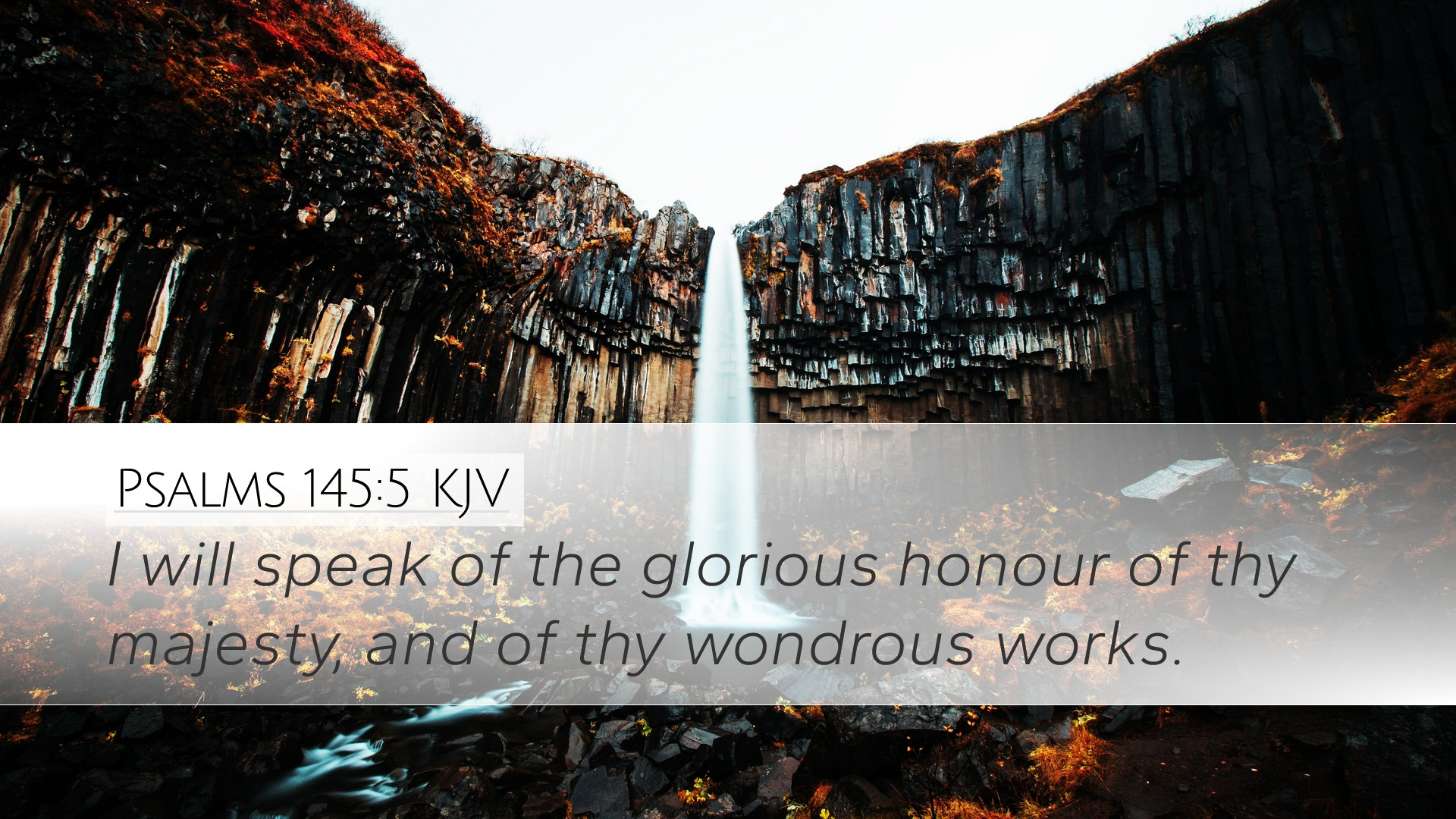Psalms 145:5 Commentary
Verse: "I will speak of the glorious honor of thy majesty, and of thy wondrous works." (Psalms 145:5, KJV)
Introduction
The Psalmist, in Psalm 145, provides a profound insight into the nature of God and the believer's response to His greatness. The verse we focus on—verse 5—highlights the dual aspects of God's majesty and His wondrous works, inviting us to reflect deeply on these themes.
The Glorious Honor of God's Majesty
Matthew Henry's Perspective: Matthew Henry emphasizes the "glorious honor" of God's majesty as a foundational aspect of our understanding of God. He notes that this majesty encompasses His supreme greatness and holiness that is worthy of reverence and awe. Our response, as believers, should be to acknowledge and exalt this majesty.
Albert Barnes's Insights: Albert Barnes elaborates on the idea of glory, indicating that it is an intrinsic quality of God that transcends human understanding. He suggests that the "glorious honor" denotes a display of God’s power, wisdom, and perfection. Our meditation on His majesty reveals a call to humility and worship.
Adam Clarke's Commentary: Clarke points out that the majesty of God is revealed through His creation and sustaining power. It’s not just a concept but manifest in the life and order of the universe. The acknowledgment of His majesty requires us to live in a manner that reflects our comprehension of who God is.
Considering God's Wondrous Works
Matthew Henry's Approach: Henry shifts the focus to God's "wondrous works," emphasizing that these works are manifestations of His character and attributes. Each act of God—from creation to redemption—bears witness to His greatness. The term "wondrous" invokes amazement and reverence, prompting believers to recognize the need to speak of these works as a testimony of faith.
Insights from Albert Barnes: Barnes highlights the significance of proclaiming God's works. He posits that recounting God's deeds serves not only as a form of worship but as an encouragement to others. The remembrance of God's wondrous acts strengthens faith and fosters a community of gratitude. His suggestions drive home the importance of sharing testimonies of faith within the Christian fellowship.
Adam Clarke's Reflection: Clarke adds depth by recalling the historical context of the Psalm, suggesting that every reference to God's wondrous works can be linked to significant events in Israel's history—such as the Exodus. He asserts that reflecting on these accounts deepens our appreciation for God’s continued active presence in our lives.
A Call to Action
This verse serves as a proclamation of intent— "I will speak." It is a deliberate decision to articulate God's greatness and works, suggesting a proactive approach to worship and testimony. Each commentator provides insights on how this call can be interpreted in practical terms.
- Matthew Henry: He encourages personal and corporate declaration of God's majesty; suggesting believers should engage in worship both privately and publicly.
- Albert Barnes: He advises that sharing experiences of God's works can build a legacy of faith, encouraging others to trust in God's faithfulness.
- Adam Clarke: Clarke's emphasis is on educational teaching—encouraging the recounting of God's works to promote better understanding within congregations.
Theological Implications
This verse encapsulates core theological tenets of majesty, glory, and the nature of divine revelation through works. It encourages believers to pursue a deeper knowledge of God, which in turn shapes their worship and daily living.
As theologians and scholars reflect on this passage, we are reminded of the importance of articulating our faith. The nexus of God's majesty and His deeds offers a framework for understanding the relationship between God and humanity, emphasizing that knowing God leads to worship and evangelism.
Conclusion
Psalms 145:5 calls each believer to recognize and declare the majesty of God through His wondrous works. The profound insights from public domain commentators provide a rich tapestry for understanding this verse. It challenges us to engage actively in worship and testimony, reinforcing our faith and encouraging others in the community of believers.


